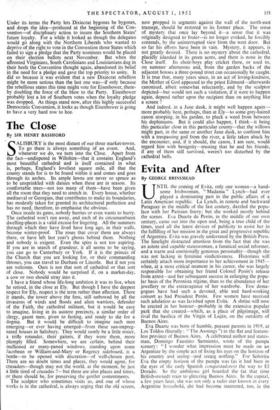The Close
By SIR HENRY BASHFORD ALISBURY is the most distant of our three market-towns.
To go there is always something of an event. And, whenever we do, we turn into the Close. Apart from the fact—undisputed in Wiltshire—that it contains England's most beautiful cathedral and is itself contained in what is, perhaps, England's loveliest square mile, all that the county stands for is to be found within it and comes and goes through its arches. Its ample lawns are never so spruce as to be unsprinkled with daisies when these are in season. Its comfortable trees—not too many of them—have been given all the room that they need to stretch in. Every house, whether mediaeval or Georgian, that contributes to make its boundaries, has modestly taken for granted its architectural perfection and has no need, therefore, to emphasise the obvious., Once inside its gates, nobody hurries or even wants to hurry. The cathedral won't run away, and each of its circumambient dwelling-places is a valid excuse for lingering. All the summers through which they have lived have long ago, in their walls, become winter-proof. The roses that cover them are always there, or have left last year's ghosts behind them. Nothing and nobody is exigent. Even the spire is not too aspiring. If you are in search of grandeur, it all seems to be saying, you can go to Canterbury or York. If it is the princes of the Church that you are looking for, or their commanding thrones, you can travel to Durham or Lincoln. But if not you are welcome. Ours is not that sort of cathedral or that sort of close. Nobody would be surprised if, on a market-day, a cow or two should stray into it.
I have a friend whose life-long ambition it was to live, when he retired, in the close at Ely. But though I have the deepest respect for Ely, respect is the term rather than affection. There it stands, the tower above the fens, still unbowed by all the invasions of winds and floods and alien warriors, defender of the Faith,' the cathedral militant, but it would be easy to imagine, living in its austere precincts, a similar order of clergy, gaunt men, given to fasting, and ready to die for a dogma. But it would be difficult to imagine such men emerging—or ever having emerged—from these sun-impreg- nated houses in Salisbury. They would surely be a little rosier, a trifle rotunder, their gaiters, if they wore them, more plumply filled. Somewhere, we are certain, behind their mullioned or many-paned windows, standing upon some Jacobean or William-and-Mary or Regency sideboard, is a bottle—to be opened with discretion—of well-chosen port. There are no doubt times and places, they would agree, for crusaders—though may not the world, at the moment, be just a little tired of crusades ?—but there are also places and times, or there should be, for preserving the gentler contentments.
The sculptor who sometimes visits us, and one of whose works is in the cathedral, is always urging that the old screen. now propped in segments against the wall of the north-east transept, should be restored to its former place. The sense of mystery that once lay beyond it—a sense that it was originally designed to foster—is no longer evoked, he forcibly contends, by the uninterrupted view from the west door. But so far his efforts have been in vain. Mystery, it appears, is not greatly desired. There is no mystery about the cathedral, placidly islanded in its green acres, and there is none in the Close itself. Its choir-boys play cricket there, or used to, on summer afternoons and, from the garden backs of the adjacent houses a three-pound trout can occasionally be caught. It is true that, many years since, in an act of loving-kindness. the Mother of God appeared to the priest Edmund—afterwards canonised, albeit somewhat reluctantly, and by the sculptor depicted—but would not such a visitation, if it were to happen again, depend rather upon the recipient than on anything like a screen ?
And indeed, in a June dusk, it might well happen again— more probably here, perhaps, than at Ely—to some grey-haired canon stooping, in his garden, to pluck a weed from between his dephiniums. But it could also happen, I think—it being this particular close in this particular county—that the willows might part, in the same or another June dusk, to confront him with a trespassing god from the river, a little taken aback by the encounter, and, if it should, the canon, I am sure, would regard him with benignity—trusting that he and his friends, if any of them still survived, weren't too disturbed by the cathedral bells.


























 Previous page
Previous page